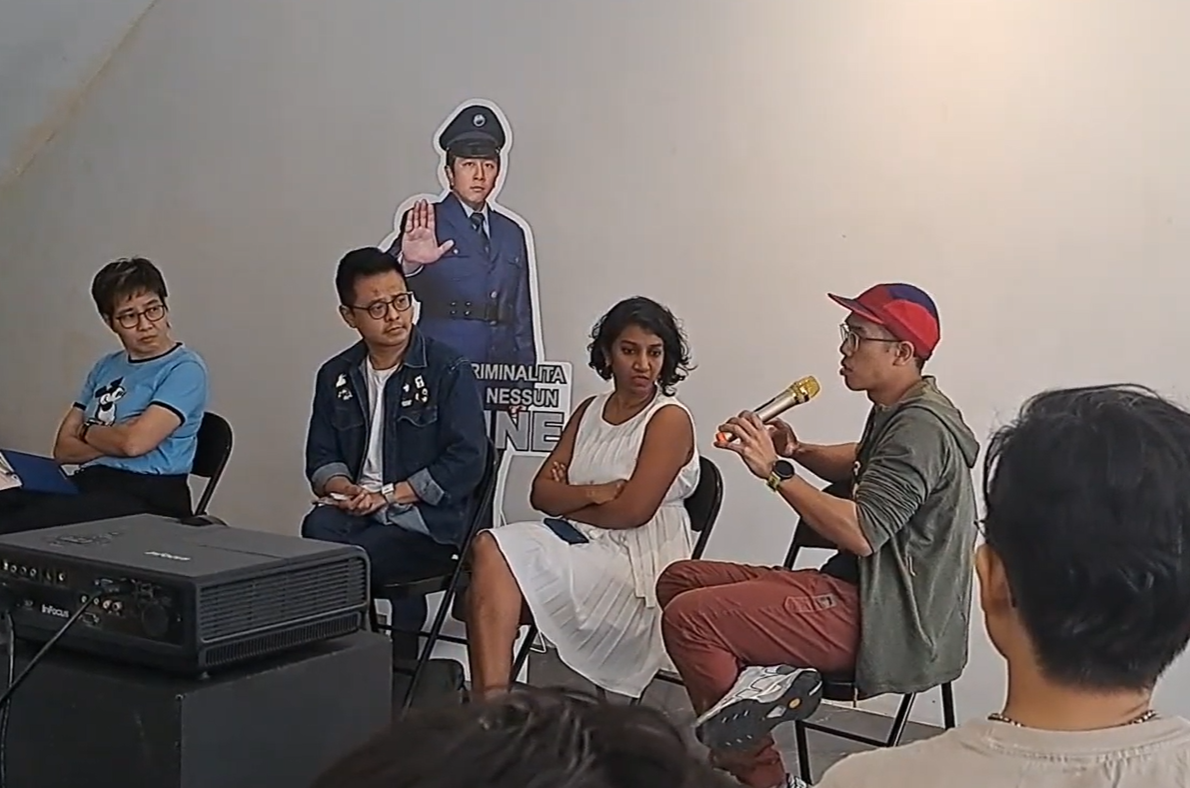Blocked. Banned. Rated R21. Licence refused. Funding pulled. Venue partner intimidated. POFMA-ed. Police investigations pursued.
On 20 Oct 2024 (1.30-3.30pm), the Transformative Justice Collective held a panel discussion titled “CENSORED: A conversation in lieu of an exhibition.” The panel discussion was moderated by Kokila Annamalai from Transformative Justice Collective, and featured Rocky Howe from Transformative Justice Collective, poet and playwright Alfian Sa’at, and independent filmmaker Tan Pin Pin.
Unfortunately, our recording device was not cooperating that afternoon and we did not manage to capture the full event on tape – but we will not let this technical difficulty block your access to the knowledge and insights shared that day! If you would like a refresher or missed the discussion, we’ve consolidated some key takeaways here. Scroll through to read more!
Takeaway 1: Especially since 2020, there has been an intensification of censorship – in both overt and quieter ways.
The voices of prisoners are increasingly silenced at different levels – the Infocomm Media Development Authority (IMDA) effectively banned the World Day 2024 exhibition and rated “Condemned” R21, increase in the use of POFMA on the dissent around the death penalty, and the Singapore Prison Service has implemented new rules that made it more difficult for prisoners to pass notes out of Prison to their families at face-to-face visits.
Family members and friends also used to be able to exchange a few words with their loved ones after court hearings, but can no longer do so with the trials being moved to Zoom. Additionally, when the former speak up, they bear the cost of facing the stigma and shame of having loved ones on death row.
Furthermore, censorship is not just silencing us by making us take down content, but now, the state also tells you what to say – there is a psychological violence when you are made to say, in your voice, what is disingenuous and against your truth when you receive a POFMA order.
Takeaway 2: When our government proclaims “national interest,” does their action actually serve state interest rather than the people’s interest?
The Singapore government uses terms like “undermine national interest” and “falsehoods” (rather than disagreements in opinions) to describe the narratives put out by the Transformative Justice Collective. They also narrate being “one-sided” as being inherently bad, and do so with a degree of hypocrisy.
You may watch “To Singapore, With Love” on YouTube at tinyurl.com/ToSingaporeWithLove
And what does “national interest” even mean? The use of it in Singapore is equated to the interest of the ruling party, giving authorities maximum leeway in making censorship decisions, such as in banning “To Singapore, With Love.” The broad wording of such censorship enables its use as an excuse without elucidating what it means, halting dialogue rather than getting any clarity.
We, the people, care about security, safety, and racial harmony, but the PAP’s interest has become branded as the people’s “national interest.”
Takeaway 3: The Death Penalty is fundamentally about the Denial of Personhood.
In 2005, Shanmugam s/o Murugesu was executed by the Singapore government. The Substation later organised a punk event to remember him, but the same government banned his face from the event posters. The state tries to deny the personhood of people on death row as part of the system of communication, so they can continue controlling the narrative.
Read more about this here: https://www.thinkcentre.org/article.php?id=2621
The denial of personhood also manifests in how prison photoshoot photo quality has become so much worse. The state wants to deface our memories and control the image of death row inmates, wanting them to be presented in the form of a mugshot, rather than someone the general public can identify with like a family photo – the IMDA disallowed the use of death row family members’ photos for the play “Accidental Death of an Activist.”
Takeaway 4: What falls under the censorship guidelines for “political” content?
There are three tiers of censorship guidelines: morality, race and religion, and political. It is unclear what is parked under “political” – what has become clear is that death penalty is. But this tier of “political” is problematic – so many things are political. There are also different standards about what is “political” – why aren’t documentaries by Channel News Asia considered “political”? Why was The LKY Musical, which was overtly political, only given a G-rating?
Takeaway 5: From Johor Bahru to Singapore – what Tan Pin Pin did after the state banned “To Singapore, With Love”
Her film, a series of interviews with Singapore political exiles, was banned on 5 September 2014. She wanted to undergo the proper appeal process because this film deserves to be seen in broad daylight. The ban remained and it was eventually screened at the Freedom Film Festival in Johor Bahru, with buses from Singapore being filled up with people who wanted to catch the film. Her team also had to print and mail the DVDs of the film from Johor Bahru so that she would not be violating Singapore’s laws on distribution. She submitted the film to the IMDA for a rating again in 2023, but the appeal failed.
Takeaway 6: The effects of being censored – the rise of creative resistance.
In response to state censorship and the need to navigate numerous restrictions, organisers and activists start thinking of how to word things, and how to engage with state bodies like NParks and IMDA. By being part of this technocratic process to work around the rules, you go against personal instincts by putting yourself in the state’s shoes.
Creative resistance has emerged amidst this, and expertise in thinking about the workarounds and grey areas. Alfian shared that when working on the play, “National Day Charade,” Kirsten Han’s videos were not allowed to be played as part of the performance, so the producers put a QR code at the audience members’ arm rests with the same videos and had a long costume change for the audience to watch them during this break.
Takeaway 7: It is not just a matter of freedom of expression, but also freedom of information.
We’re so accustomed and skilful to adapt and outsmart the system, engage in outright deviance and civil disobedience, and sometimes, there is self-censorship and compliance. The 4tahun kind of response is to keep things censored – it is a collective responsibility to look at this emptiness and contend with what we lose. What do we lose and what is the impact on the people when we don’t get to know and learn and think and make up our minds, when we are only told one story again and again and again? What is the psychological violence?
We need freedom of information – the circulation of information and our right to receive information. The people also need to feel that they are deprived of their rights when the freedom to share information is suppressed, especially when censorship replaces our own ability to process information. As a people, what are the values and social memories that matter to us?
Takeaway 8: The state is afraid of the people’s political agency.
The death penalty is crucial to defining exactly the character of how the state relates to the citizens in any other way, which is important to the culture of fear and obedience and has nothing to do with drugs. When we interrogate what the death penalty is, we interrogate the exercise of state power to take away life, which is fundamental to the legitimacy of the system and a symbol of its power. When this is challenged, censorship comes in.
Stories about people’s political agency (e.g. political exiles, people struggling against the system) are most heavily shut down, because the state is afraid that when we learn about the stories, we can learn from them to exercise our own political agency – this is what is fundamentally being censored. To know that there is a possibility to have fire in your bellies and live a different way and pay a price for your beliefs and principles is dangerous to the state and threatens the PAP government.
The state also tries to co-opt our wins and struggles – our ministers tend to say that because Singapore has Pink Dot, gay people here have freedom, but the reality is that there is Pink Dot because people are fighting for their freedom.
Takeaway 9: We need to be steadfast in our defiance of censorship.
The blank wall is how the Transformative Justice Collective is communicating about censorship.
Power can also sometimes undermine itself – the more POFMA is used liberally, the more it undermines the credibility of the system itself and https://www.gov.sg/factually will be seen more and more as a propaganda arm. There is a degree of the state’s desperation to keep people from tearing down the institution – and the state will break first when we keep pushing back. More and more people will see and recognise the stupidity of how the state goes about justifying their system of censorship – because we have a government that is authoritarian that likes to pretend that it is a democracy, it finds itself in an endless cycle of trying to justify its actions.
While we question whose interests censorship protects and betrays, we also need to act like things will change. The panel concluded with Alfian quoting Antonio Gramsci’s letter from prison, “I’m a pessimist because of intelligence, but an optimist because of will.”
Watch snippets of this event and the full recordings of our other World Day 2024 events at https://tinyurl.com/worldday24videos


Tinggalkan Balasan